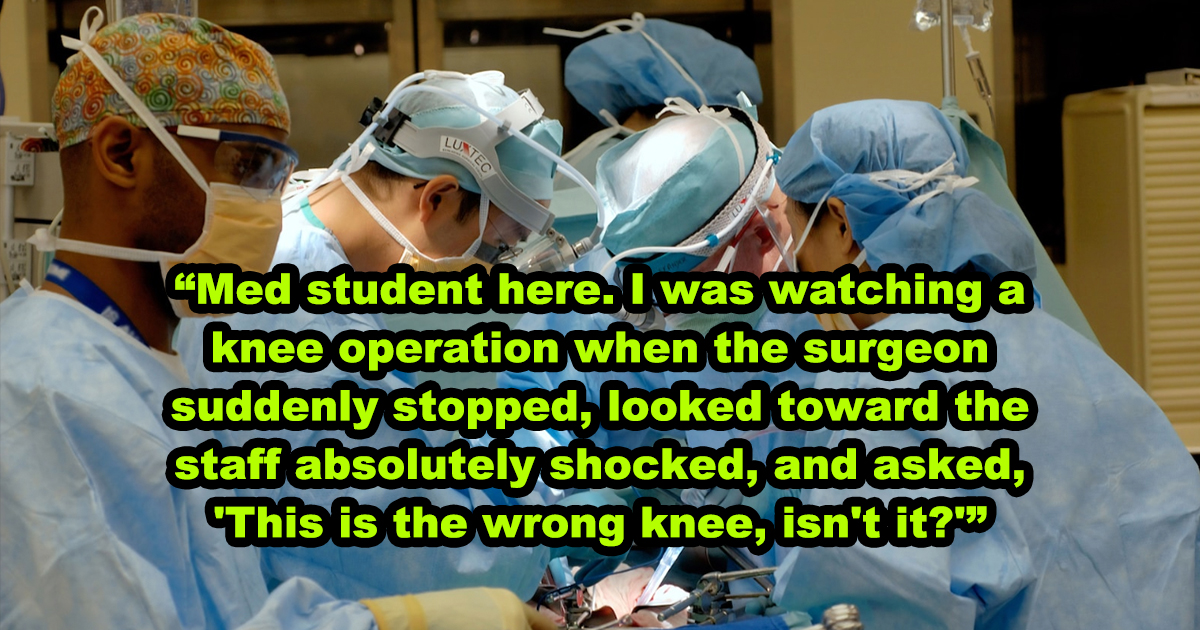18 Surgeons Share Their Most Terrifying Experiences During Procedures
Step into the high-stakes world of the operating room, where skilled hands and quick decisions hold the balance between life and death. In this gripping post, we’re delving into the unnerving tales directly from the surgical theater – Surgeons sharing their most heart-pounding and spine-chilling experiences during procedures.
Here are 18 stories that made our palms sweat a little bit:
1.
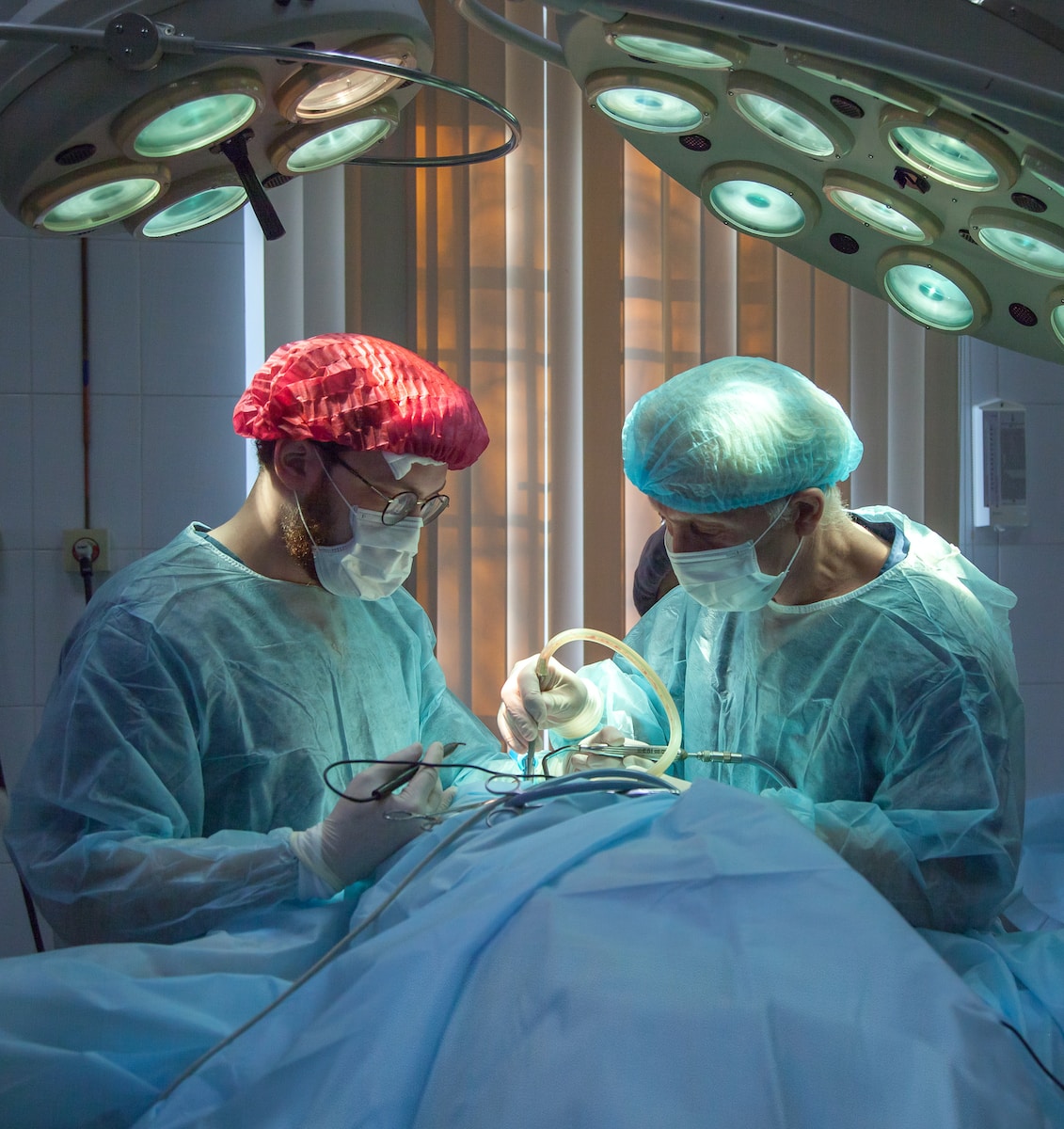
“Med student here. I was watching a knee operation when the surgeon suddenly stopped, looked toward the staff absolutely shocked, and asked, ‘This is the wrong knee, isn’t it?’ Basically, he was told to operate the wrong knee, and halfway through, he realized it was too ‘good-looking’ to be the knee that needed the operation.”
“Luckily, there was no permanent damage done, the team reknit everything together, and rescheduled the surgery.” —u/Icnaredef
2.
“When I was in residency, my first solo procedure was a spinal surgery on a 16-year-old girl. At the end, after 13 hours, I was closing her up, and I accidentally ripped her dural sac — shredded the base of the spine where all the nerves come together, the membrane as thin as tissue. And so, it ripped open, and the nerves just spilled out of her like angel hair pasta, spinal fluid flowing out of her, and the terror was just so wild. So real.”
“I knew I had to deal with it. So, I just made a choice. I’d let the fear in, let it take over, let it do its thing, but only for five seconds, that’s all I was going to give it. I started to count: one, two, three, four, five. Then, it was gone. I went back to work, sewed her up, and she was fine.” —u/bugspotter
3.
“I’m a spine surgeon. At the time, I was still a resident and was doing kyphoplasty. In brief, it’s a procedure in which bone cement is placed in a fractured vertebra using needles. So, during the procedure, I misunderstood the length of such needles and placed one in a position where it could have lacerated the aorta or the cava vein. As soon as I realized the mistake, I immediately removed the needle, and then, I spent the longest five minutes of my life staring at the parameters with the anesthesiologist, to check whether the blood pressure remained stable. My guardian angel was for sure looking down because I was so lucky that no vessel was damaged.”
“But I definitively had the feeling that I used my wildcard there and that I will never be again so lucky in the future. Anyway, now I am super careful when doing this, and I keep telling this story to my residents to teach them.” —u/astral_slide
4.
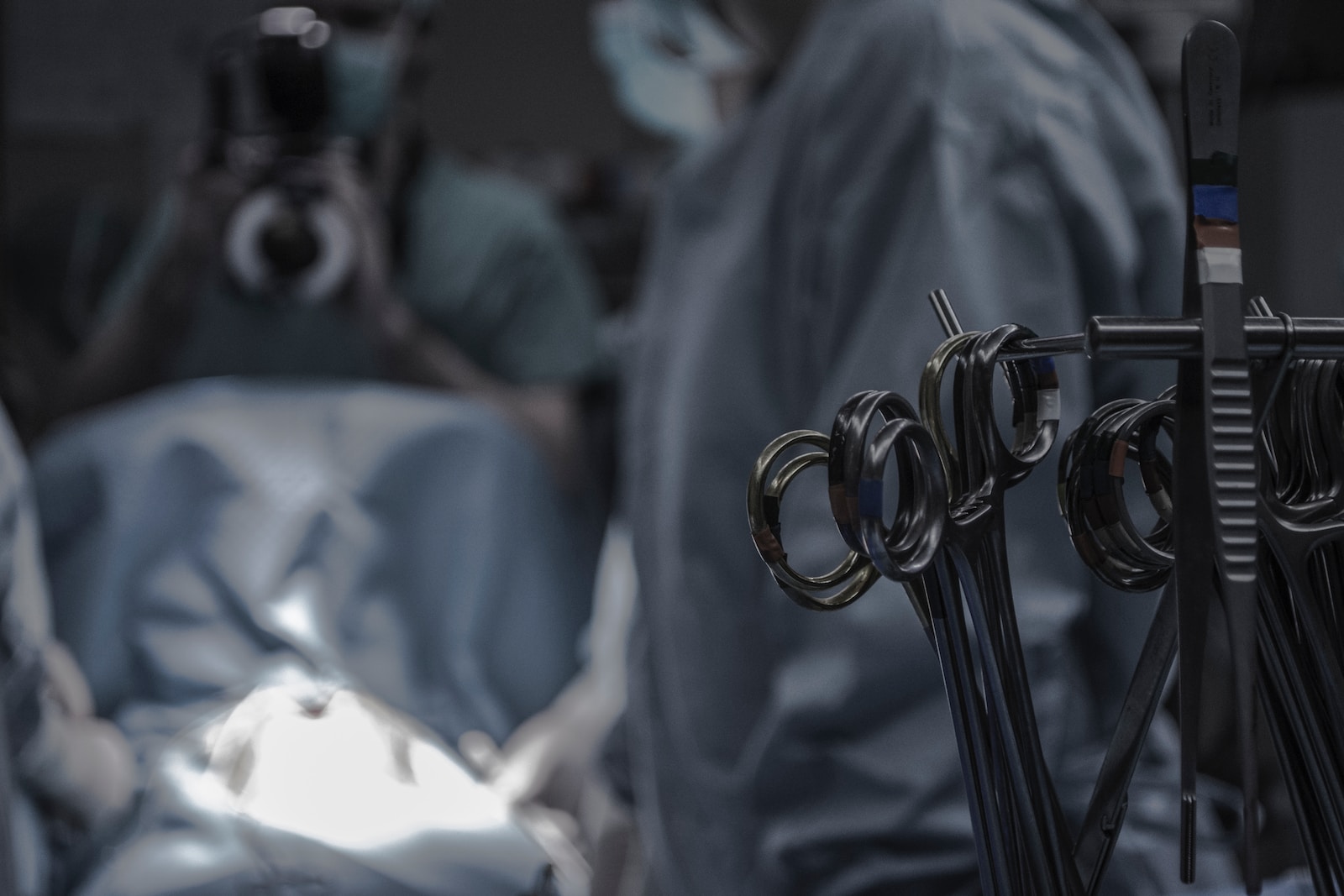
“When we opened the abdomen up of this woman in her late-20s, the entire room instantly smelled like hot rotting flesh. We were doing an exploratory laparotomy because she had such severe abdominal pain she couldn’t sit still for a CT scan, and the X-ray just suggested some free fluid in the abdomen. A paracentesis (draining fluid from the abdominal cavity) didn’t really do anything, so the surgeon was kind of going in blind. But her indication for surgery was the extreme pain and the rock-hard feeling in her abdomen. When he cut her open, he saw that she was going into multiple organ failure with a ton of tissue simply rotting.”
“The smell enveloped the room instantly, anesthesia was gagging, and I ran to grab the peppermint oil to rub on our masks. The surgeon looked at the abdomen for about 20 seconds and said, ‘Well, anesthesia I think she’s about to crash. I imagine this pressure in the abdomen was the only thing giving her any blood pressure.’
She did crash, and she died there on the table.This young woman had been an extremely heavy meth user; her mom had started her out using meth with herself when the girl was a teenager. They figured she probably got a bloodstream infection from injections with dirty needles, and that just spread through her body like wildfire. I’m the OR nurse that was present for the case. I wasn’t in charge of any diagnostic testing or any preoperative/emergency care.” —u/mcnew
5.
“My father went to hospital with chest pains; they decided to do an angiogram. Dye injected, he’s lying under the machine, and the surgeon suddenly changes his procedure. ‘Are you ok…feeling well? Any blackouts?’ He said, ‘No, just pain.’ A few more docs come in and are looking at the screen. They take him to another type of X-ray machine and again are looking in bemusement without explaining anything. ‘You have a blood clot the size of a golf ball floating free in your heart. It’s bouncing around the valves, and we would expect you to have died very quickly from this.'”
“So, they give him super strong clot busters, but they were concerned it might shrink enough to get jammed. A lot of experts turned up. All went well, and he had a triple bypass a few months later. That was 30 years ago; he’s 87 now and can walk with ease up steep hills.” —u/monkeypowah
6.
“I have so many stories. There was an 80-year-old who came in with a self-inflicted shotgun wound to the chest. As we are fighting to get him stabilized and the surgeons are working to plug all the holes, none of us can figure out why the guy keeps oozing blood. Then, we find out that he had intentionally overdosed on blood thinners before shooting himself. We kept him alive long enough to let the family come into the OR and say goodbye.” —u/pdxdaj
7.
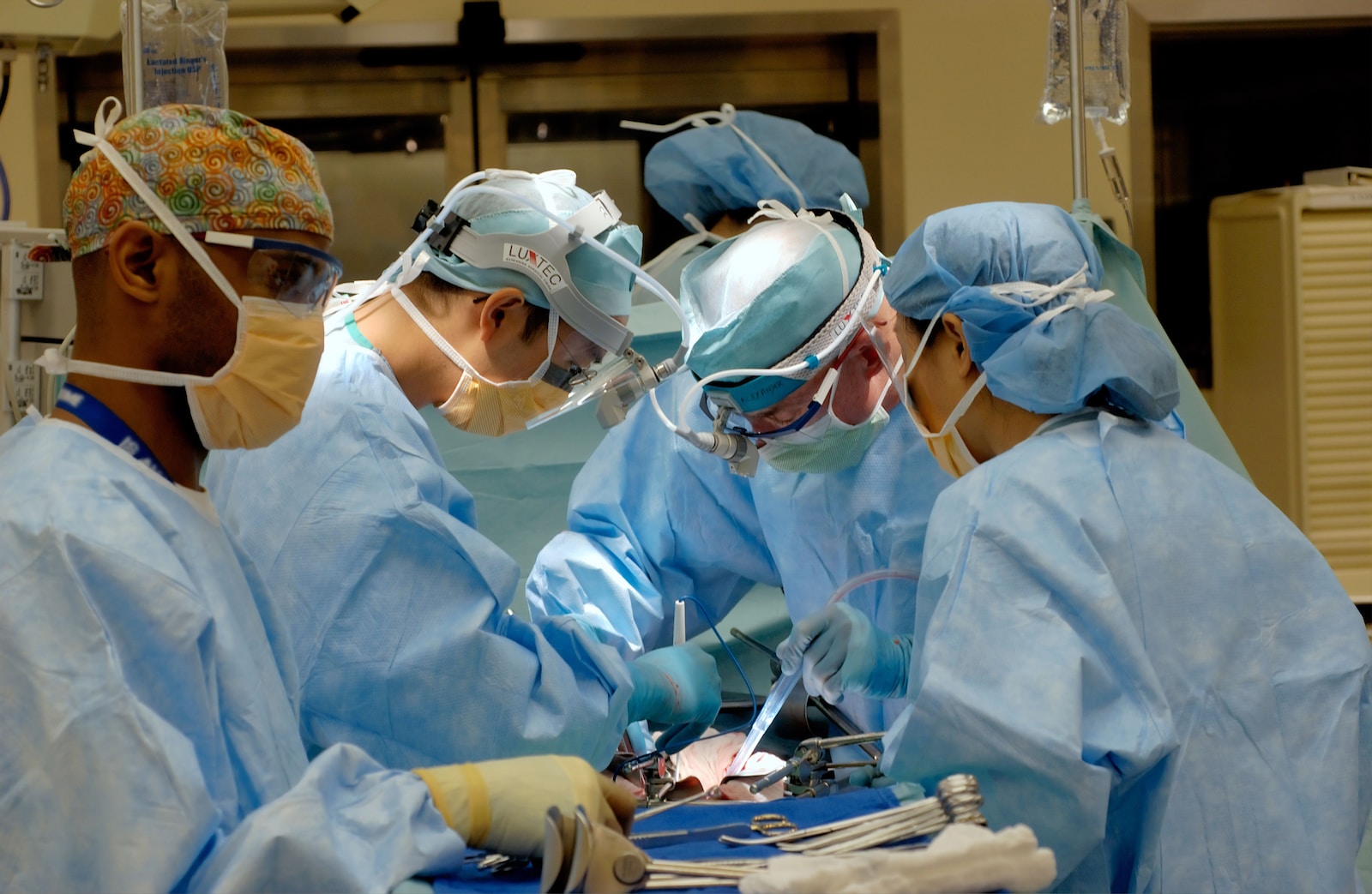
“A 45-year-old came in via private car (family drove him in, rather than an ambulance) after what was described as a ‘head injury.’ We realized how bad it was when someone noticed a plastic grocery bag lying on the patient’s belly. It contained the brains that the family managed to scoop up, in the hopes that we could re-implant them.” —u/pdxdaj
8.
“There was a 30-something meth addict who also had a permanent catheter infusing lifesaving medication directly into his chest for pulmonary hypertension. He came into the ICU with PH (pulmonary hypertensive) crisis, and then we found out why: He had been injecting meth into the catheter, creating a hole through which his lifesaving medication leaked out.”
“Medicine is a lot of things. Sometimes it’s just tragic.” —u/pdxdaj
9.
“This was my very first day of surgery rotation when I was still in medical school. A middle-aged lady was brought in, unconscious, pale, and possibly bleeding internally; she was stabbed multiple times in the abdomen. We immediately cut her abdomen open trying to find the source of the bleeding. After a few moments, we were able to stabilize her and checked every segment of her intestines for any bleeding. We located a few and were able to cauterize and suture and whatnot. There was actually one stab wound that missed a major artery by millimeters. As we were placing back the guts into the cavity, my chief resident decided to take one more look underneath, and he accidentally opened up a big artery (most likely had an initial slight damage to it due to the patient), and it started bleeding like wild.”
“Reminded me of that famous scene from The Shining. We had to call the chief surgeon stat, even though he was on vacation, but he answered and was calm and told us what to do in a calm manner via the phone. I was so scared — really thought the patient was a goner when I saw that massive hemorrhage happen before my own eyes. We were able to control the bleeding by a combination of aggressive cautery and some pressure and suturing. Definitely something I won’t forget. The patient was able to live, and I was able to talk to her a few days later as she recovered in the ICU bed, but man, that was a wild experience in the operating room. One of the more action-packed days as a medical student. (I’m now a graduate, planning to land a residency somewhere this cycle.)” —u/ghost_haha
10.
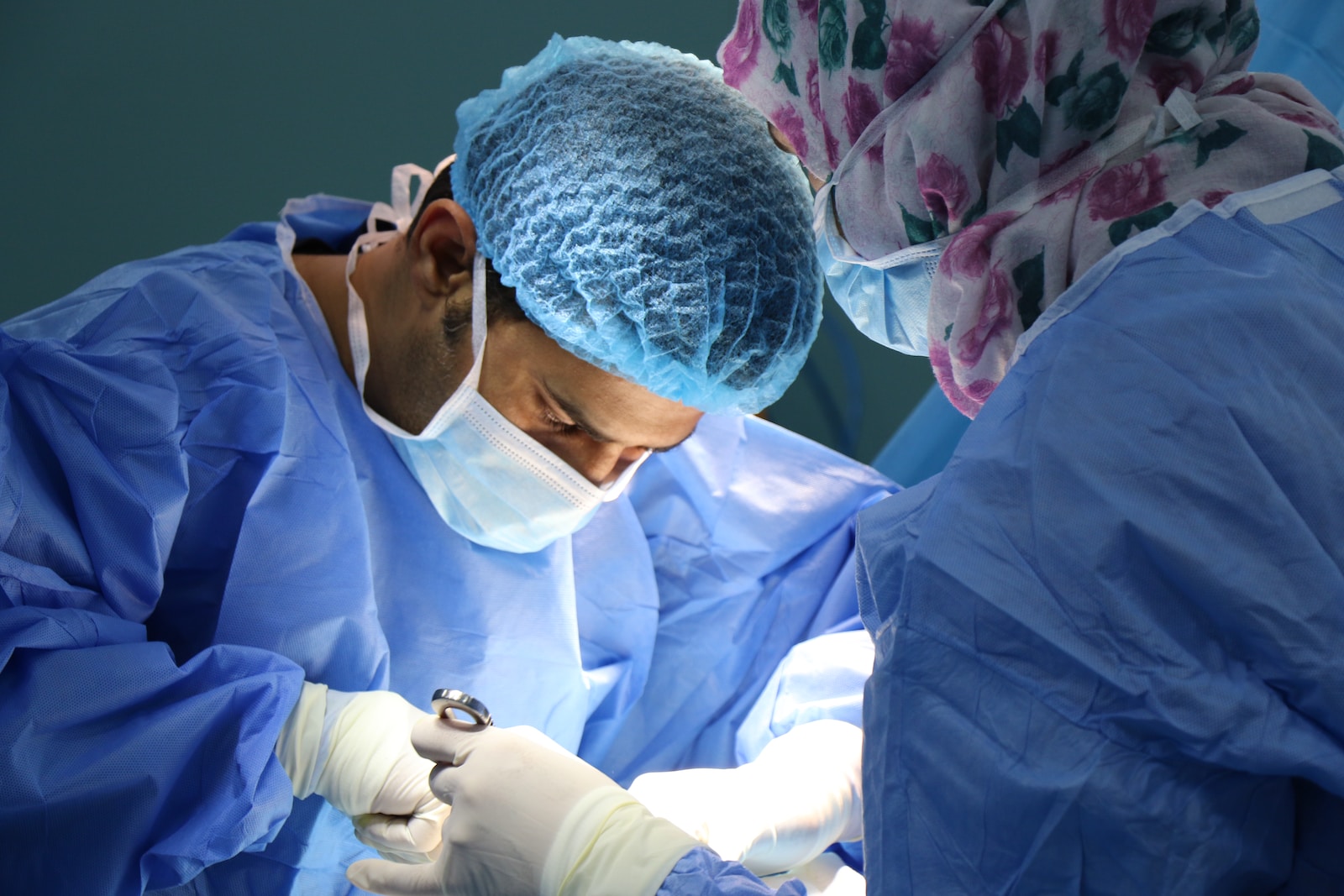
“I got this information from the surgeon relating to my father. My father was diagnosed with an umbilical hernia from external observation and scheduled surgery based on this information. When opening my father, they discovered that what appeared to be a hernia was actually cancer that was determined later to be Stage 4 cancer that started in the appendix.”
“This was really saddening as my father had believed he had the hernia for several years, but waited until it started hurting before doing anything about it.” —u/whalefromabove
11.
“I’m a veterinarian, and we do quite a few surgeries. ‘Mistakes’ likely happen all the time. From nicked blood vessels to skin/organ tears. Most are probably fairly minor. In the veterinary world, I’ve certainly heard stories of male animals having an abdominal incision during a neuter since someone thought it was a female for a spay. Wrong limbs can be amputated. Surgical instruments and sponges/gauze can be ‘forgotten’ in patients. There are many pre- and intra- surgical checklists to help prevent these, and I’m sure it’s even more developed in human medicine.”
“Fortunately, for me, the biggest surgical mistake is probably a suture slipping when removing an organ resulting in minor internal bleeding — it’s fairly easy to find the bleeder and get things stopped rather quickly. Or, having a small bone break when repairing another fracture. Things happen. We address it and learn from it for all future patients.” —u/WildlifeDoc
12.
“I have many stories. One is when a healthy, 23-year-old male came into ER with chest pain. Normal vital signs, never a smoker, normal chest X-ray. The pain started after eating something spicy, so we tell him it’s probably GERD. Five minutes later, he drops dead in his bed. We start CPR and get a pulse back. He gets stabilized, gets a CT scan, and has an aortic dissection, and then he dies again in the CT scan and never makes it to the OR.”
“The guy’s major blood vessel basically just exploded. This happens to men in their 70s with a long smoking history and high blood pressure. This healthy 23-year-old had absolutely zero risk factors for this (no evidence of Marfan syndrome or Ehlers-Danlos syndrome for the med people reading this). Still makes no sense to me.” —u/crazycarl1
13.
“Med student here. I was going to be watching a procedure of a 60-something-year-old lady getting her pacemaker leads changed on a Monday. Well, right before the attending began the procedure, and she was still a little awake before the anesthesia was completely administered, she let everyone know that she had smoked crack the day before. The procedure had to be postponed to Wednesday of that week to let the cocaine get out of her system.”
“Then, when the attending called the sister of the patient to let her know the results and any precautions they had to take, the sister asks the doctor ‘if her sister could smoke again.’ Because the phone was on speaker, the entire room just facepalmed.” —u/sirmaddox1312
14.
“From my days as a vet tech about 20 years ago, we had a small dog in for surgery because he (if I remember correctly) hadn’t peed for days, but was otherwise healthy. Some sort of blockage that couldn’t be handled in the exam room. So, we get him sedated and prepped for surgery. The dog is splayed open on the table, and his poor bladder was as full as the best water balloon you’ve ever seen — except this is full days-old urine. And of course, like a good water balloon, the slightest pressure caused it to burst all over me and the doctor. So, I’m in shock. Pee dripping off my face and covering my scrubs. No mask, face shield, etc.”
“This was a vet office in Alabama. We didn’t use PPE, except I desperately need PPE at that moment. We cleaned up the dog, got the ruptured bladder repaired, and stitched him back up. I’m pretty sure that was the moment when I decided my childhood dream of being a vet wasn’t quite as glamorous as I thought.” —u/BigCrawley
15.
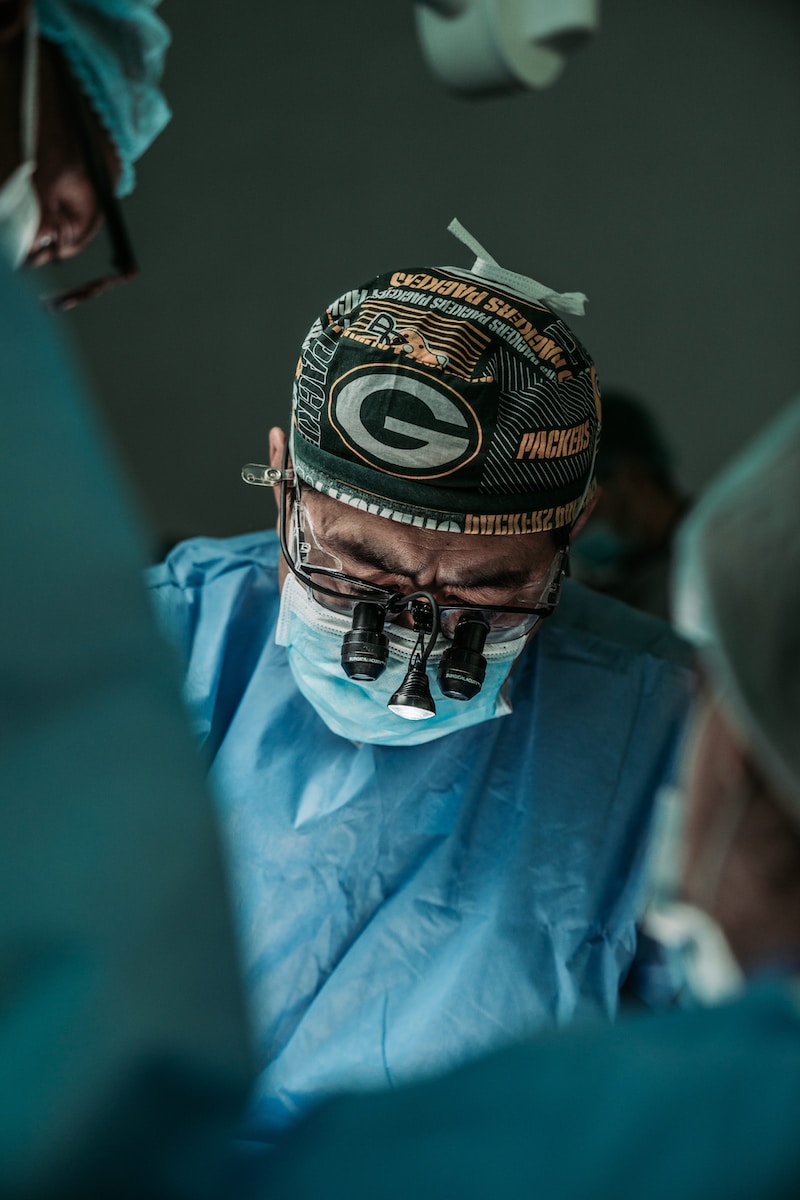
“I was a medical student, on my anesthetics placement. I went to see a patient due for surgery that morning. On my way back for briefing, the nurse comes running down the corridor to tell me that the patient had been fully anticoagulated the night before because the surgeons had forgotten to un-prescribe it. If nobody had stopped us before we gave her the epidural, she would have bled into her spine and become paralyzed even before the surgeons opened her up — and that would have been even worse because had she bled, we wouldn’t have been able to stop it.”
“It’s hard as a medical student to know your place and when to speak up; you’re surrounded by professionals, and when you see something like a full therapeutic dose of anticoagulants on the patients drug list, you don’t want to question it because surely everyone above you knows what they are doing? The consultant I was working with told me there have been stories of medical students not speaking up when surgeons have started operating on the wrong side, giving drugs where it is contraindicated, etc., and they have known.” —u/yagokoros
16.
“I’m a surgeon, and I also do litigation work. So, most ‘errors’ in surgery are not related to someone slipping and accidentally cutting the wrong thing, although that can happen with misidentification of anatomy such as bile ducts during gallbladder removal (a surprisingly common error) — it’s usually errors in decision-making, such as the timing of surgery. There are, however, sentinel or never events that you hear about (retained objects, operating on the wrong organ, wrong side, etc.) — that also are surprisingly common. These are considered systemic errors — on root cause analysis, they usually aren’t due to just one person, but a series of mishaps involving multiple people and multiple processes.”
“Despite time-outs (everyone verbally agreeing to the demographics, operation, allergies, laterality, etc.) before starting, double counting instruments and surgical sponges, and even RFID-embedded instruments and surgical sponges, surgeon marking of the site, and patient marking of the site, objects get left behind, and wrong sides get operated on, still. The field has not figured out how to get that number to zero. As you can imagine, ORs can be extremely busy and complicated places. I’m super paranoid about these types of errors since I’ve done research and litigation work in them, but the mistakes that haunt me are the ones regarding decision-making — particularly waiting too long to operate on someone because you’re trying to decide if they truly have the diagnosis that you suspect, or even if they do, if it can be better managed non-operatively because they are a poor surgical candidate and might die from the operation anyway. But it’s tough because you can’t just make a personal policy — like, in ‘X’ situation, I’m always going to operate!’ just to avoid the mistake of waiting. Because you will have performed morbid procedures on more patients that required it. This is also why pure algorithms or objective data from labs and imaging studies, even with machine learning, can’t always make the right decision. There are subtle, nuanced factors that experience, instinct, feeling out what the patient wants, and guessing what will cause more damage (operating or not operating) that play into it.” —Anonymous
17.
“Evisceration is always a great surprise on rounds — imagine walking by your post-op patient and seeing their intestines out. The worst was when a nurse called me into the ICU, saying there was bleeding coming from a guy’s neck. He just had surgery on his neck after getting stabbed there. Walk into the room, and they are holding pressure. I take down the bandages and blood starts shooting out of his neck; it was a decompressing hematoma. Turns out, they didn’t fix one of the holes in his carotid artery.”
“Another guy got stabbed in the neck and had low pressure when he arrived. As we give him blood, he starts pouring it out of his neck. I am holding pressure hard as we run to the OR. Transected his jugular vein. He lived.
Another guy got shot in the chest. Initially, he was OK, but then he starts dying in front of us. We crack open both sides of his chest and clamp his lung where the blood was leaking from. He was talking to me a day later; he went home to see his newborn two weeks later.”
18.
“I’m a surgeon. Some young guy, 21 years old, came into the ER at 3 a.m. with a stab wound. He waited hours before he decided to come in, laughing and joking around, and brought his whole family — mom, dad, brothers — and friends. Was a trauma Level 1, and we brought him immediately to the trauma room…his body was trying to compensate for the loss of volume. As soon as we brought him back, he coded, and he was never brought back. A last-ditch effort was made, and a manual cardiac massage was attempted; they crack your chest open and manually pump your heart to restart it. The knife had nicked his abdominal aorta, and it completely ruptured — liters of blood spilled into the floor. It was like a scene from a movie.”
“Meanwhile, his friends were having a pizza party in the waiting room, laughing and having a good ol’ time when we had to tell them he died. All hell broke loose, and they stormed the ER by force. Security and police were called, and punches were thrown. His brother got a glimpse of him and yelled, ‘You killed him! He came in, walking, whistling like nothing, and you guys murdered him for his organs!’ Punches were thrown, and people were tased. Good times…” —u/Yellow_filletofish

